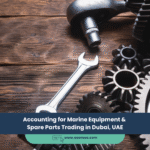Accounting for Safety & Fire Fighting Equipment Trading in the UAE
In the UAE, a region defined by iconic skyscrapers and large-scale industrial projects, the safety and fire fighting equipment industry is not just a business—it’s a critical pillar of public safety. Governed by stringent regulations from authorities like the Dubai Civil Defence, suppliers in this sector operate under immense pressure to ensure every product is certified, effective, and reliable.
- Accounting for Safety & Fire Fighting Equipment Trading in the UAE
- Challenge 1: Managing Certifications and Inventory Expiry
- Challenge 2: Revenue from Annual Maintenance Contracts (AMCs)
- Challenge 3: Project Installation Costing
- What Excellence Accounting Services (EAS) Can Offer
- Frequently Asked Questions (FAQs)
- Your Business's Financial First Responder.
This operational responsibility creates profound accounting challenges that go far beyond standard trading practices. Businesses must manage inventory with strict expiry dates, account for complex project installations of fire suppression systems, and correctly recognize revenue from long-term Annual Maintenance Contracts (AMCs). A simple error in inventory valuation or revenue recognition can not only distort financial reality but also pose significant compliance risks.
This guide provides a detailed blueprint for accounting in the safety and fire fighting equipment industry. We will dissect the key financial complexities, from managing product certifications and expiry dates to project installation costing and AMC revenue recognition under IFRS 15, ensuring your business maintains financial health and impeccable compliance.
Key Takeaways
- Track Certifications & Expiry: The cost of product certifications is a key business expense. Inventory with expiry dates (e.g., fire extinguishers) requires provisions for obsolescence.
- Defer AMC Revenue (IFRS 15): Revenue from Annual Maintenance Contracts must be recognized over the life of the contract, not when cash is received. This is a mandatory IFRS requirement.
- Use Project Accounting for Installations: For large installations, costs (labor, materials, overheads) must be allocated to specific jobs to determine true project profitability.
- Capitalize Installation Costs Correctly: Direct costs associated with bringing an installed system to working condition should be part of the project’s cost, not immediately expensed.
- Compliance is Non-Negotiable: Accurate records are essential for demonstrating compliance with Civil Defence regulations and for accurate VAT and Corporate Tax filings.
Challenge 1: Managing Certifications and Inventory Expiry
Unlike standard goods, fire and safety equipment is heavily regulated. Each product, from a smoke detector to a fire pump, must be certified by relevant authorities. Furthermore, many items have a limited shelf life.
Accounting for Certification and Expiry:
- Certification Costs: Fees paid to bodies like the Dubai Civil Defence for product testing and approval are a necessary cost of doing business. These are typically treated as an operating expense in the period they are incurred. For a multi-year certification, the cost could be capitalized as an intangible asset and amortized.
- Inventory with Expiry Dates: Items like fire extinguisher canisters, breathing apparatus cartridges, and medical kit supplies have strict expiry dates. Your inventory system must track these dates meticulously.
- Provision for Expired Stock: You must create a provision for inventory that is nearing its expiry date. This involves making an accounting entry to recognize an expected loss and reduce the value of the inventory on your balance sheet before it officially expires. This ensures your assets are not overstated. A robust accounting review process can help formalize this policy.
Challenge 2: Revenue from Annual Maintenance Contracts (AMCs)
A significant and stable revenue stream for fire safety companies is AMCs, which cover regular inspection, testing, and servicing of installed systems. The accounting for this is governed by IFRS 15, “Revenue from Contracts with Customers.”
The core principle is that revenue must be recognized as the service is performed. When a client pays AED 6,000 for a one-year AMC, that money is initially recorded as a liability called **Deferred Revenue**.
Example: A client pays for a 1-year AMC (AED 6,000) on July 1st.
- On July 1 (Cash Received):
Debit: Cash/Bank AED 6,000 Credit: Deferred Revenue AED 6,000- On July 31 (End of Month 1): You recognize one month’s worth of revenue.
Debit: Deferred Revenue AED 500 Credit: Service Revenue AED 500This process, managed through diligent accounting and bookkeeping, is repeated monthly, ensuring revenue is matched to the service period.
Challenge 3: Project Installation Costing
Selling and installing a complete fire suppression system for a new building is a project, not a simple sale. To understand profitability, you must use **job costing** or project-based accounting.
This involves creating a unique “job” in your accounting system and allocating all associated costs to it:
- Direct Materials: The cost of all pipes, sprinklers, pumps, and control panels used for that specific project.
- Direct Labor: The wages and salaries of the engineers and technicians for the time they spend working on that specific installation.
- Allocated Overheads: A portion of the indirect costs of the business (e.g., project manager salaries, vehicle costs, tool depreciation) allocated to the job on a logical basis.
The total of these costs gives you the true cost of the project, which is then compared against the project revenue to determine its profitability. This level of detail is essential for future bidding and is a core component of effective business consultancy.
What Excellence Accounting Services (EAS) Can Offer
The high-stakes nature of the fire and safety industry requires uncompromising financial accuracy. EAS provides tailored accounting services to help you meet these demands.
- Project Accounting & Job Costing: We help you implement systems to track the costs and profitability of each installation project, providing the insights you need for competitive bidding.
- AMC Revenue Management: Our team manages your deferred revenue schedules, ensuring IFRS 15 compliance and providing clear visibility into your recurring revenue streams.
- Inventory Control Systems: We can assist with implementing accounting systems that track expiry dates and help you establish formal policies for obsolete stock provisions.
- Corporate Tax & VAT Filing: We ensure your project costs, provisions, and AMC revenues are treated correctly for both Corporate Tax and VAT filing, keeping you compliant with the FTA.
Frequently Asked Questions (FAQs)
You must create a “warranty provision.” Based on historical data, you estimate the future cost of warranty claims as a percentage of sales. This estimated amount is expensed at the time of sale and a corresponding liability is created. When an actual repair is done under warranty, the cost is deducted from this provision liability.
Staff training costs are considered operating expenses and should be expensed in the period they are incurred. While they provide a future benefit, accounting standards do not permit the capitalization of training costs.
Under IFRS 15, nothing is truly “free.” You must allocate the total transaction price to the different performance obligations (the system and the service) based on their standalone selling prices. This means you would recognize a portion of the revenue for the system upfront and defer the portion allocated to the AMC over the year.
Demo units are not inventory for sale; they are company assets (Property, Plant, and Equipment). They should be capitalized on your balance sheet and depreciated over their useful life. When you eventually sell a demo unit, it’s treated as the disposal of an asset.
The initial testing fee and any subsequent re-testing fees are all operating expenses. They are part of the research and development or compliance costs of bringing a product to market and should be expensed as incurred.
Yes. For long-term installation projects, you can often recognize revenue over time using the “percentage of completion” method. This is typically measured by “cost-to-cost”—i.e., if you have incurred 60% of the total expected project costs, you can recognize 60% of the total project revenue.
These spare parts are part of your inventory. They should be valued at cost. When a part is used for an AMC job, its cost is transferred from the “Inventory” asset account to a “Cost of Services” expense account, matching the cost against the service revenue being recognized.
A specific, well-documented provision based on a clear policy of identifying near-expiry stock is generally a deductible expense for UAE Corporate Tax purposes. A vague, general provision without clear supporting evidence may be disallowed by the tax authorities.
Yes. The cost of the chemical powders, foam, or gases used to refill extinguishers during an AMC service is a direct cost of fulfilling that contract. It should be expensed as part of your “Cost of Services” in the period the refilling takes place.
Strong project accounting provides clear visibility into your profitability and cash flow from large contracts. When seeking financing, being able to present detailed reports showing a history of profitable project execution and a pipeline of future work gives lenders and investors significant confidence in your financial management and business viability.
Conclusion: Building a Foundation of Financial Safety
In the fire and safety equipment industry, precision and reliability are paramount. This ethos must extend to your accounting practices. A financial framework that meticulously tracks certifications, correctly defers service revenue, and accurately costs major projects is the only way to ensure compliance and build a truly profitable business.
By embedding these specialized accounting principles into your operations, you create a foundation of financial safety that supports your critical mission of protecting lives and property across the UAE.
Your Business's Financial First Responder.
Let Excellence Accounting Services manage the complexities of project costing, AMC revenue, and inventory compliance, so you can focus on your core mission.




